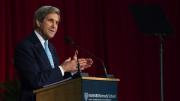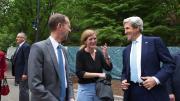Former secretary of state John Kerry lingered casually in John F. Kennedy Park, chatting with colleagues and admirers, before ascending the stage to deliver this year’s Commencement address to graduates of Harvard Kennedy School. Dean Douglas Elmendorf introduced the former soldier as a public servant who had distinguished himself first as a dissident regarding American military strategy in Southeast Asia. “He co-founded Vietnam Veterans of America, and became a spokesperson for Vietnam veterans against the war,” Elmendorf said. “Indeed, at the Kennedy School we are proud of our graduates who have worked for governments, and also proud of our graduates who offer principled resistance to governments.” Kerry’s address—a longer than usual, often partisan plea to Kennedy School graduates—would end on a similar theme, urging the audience that activism, properly deployed, could accomplish anything.
“We have seen what activism can do when young people put their minds to it,” Kerry said. “When I was in college, I listened to an activist by the name of Allard Lowenstein, who came to Yale and gave one of the most impassioned speeches I’d ever heard…It compelled us, many of us, to engage in the struggle for civil rights in our own country. And we lined up buses in the streets of New Haven that drove students from Yale and elsewhere south to be part of the Mississippi voter registration drive and help break the back of Jim Crow.”
“One of my favorite poems is T.S. Eliot’s ‘Love Song of J. Alfred Prufrock,’” he continued. “And I challenge all of you never to wind up fretfully musing as Prufrock did: ‘Do I dare disturb the universe? … In a minute there is time for decisions and revisions which a minute will reverse.’ Class of 2017: Your job is to disturb the universe.”
Activism and conscious dissent were the antidotes Kerry offered to a world of dark and unforeseen challenges. “I refuse to self-consciously twist myself into a pretzel and put on a contrived mantle of bipartisanship that alleges both parties are to blame for what’s going on—or not going on, as the case may be,” he said “And anyway, you wouldn’t buy it, since so many of you have marched and protested in order to take a public stand on your own.” He went on:
My travel to Asia, the Middle East, and Europe these last months has informed me that the global community is watching and unsettled about the leading nation of the free world. They see us gridlocked and politically trapped in a low-intensity, internal conflict of our own. They see us unilaterally disarming in the battle of values. They see us walking away from a century of thoughtful, carefully conceived economic and strategic leadership. They see a volatility and unpredictability that create confusion. They see a budget proposal that eviscerates diplomacy and reduces America’s engagement, which has traditionally defined our leadership in the world….And the truth is—no, this is not a normal time. It’s not normal to see a president of the United States decrying “so-called judges.” It’s not normal for the leader of the country that invented the First Amendment to routinely degrade and even threaten journalists. And no, it’s not normal to see the head of the FBI fired summarily because he was investigating connections between Russia and the presidential campaign of the very man who fired him.
With respect to those challenges, of restoring faith in the nation’s institutions, Kerry said, “The institutions the founders created to hold America together have always worked best when America needed them the most…count me an optimist.” He had seen the nation emerge from Watergate, and elect a wave of new representatives to Congress who promised to “clean up the corruption” in Washington. It’s the long-term crises, Kerry said, that make him more afraid: “While we are fighting just to hold on to truths long ago decided, far more is at stake—and we aren’t even scratching the surface. It’s in the struggle for the future…the challenges that we aren’t confronting, the issues that we aren’t facing, the questions that leaders aren’t even asking, where we need to shake the free world out of its slumber and wrestle with what’s really coming at us.” Challenges, he said, like the pace of technological change, with the potential to rapidly destroy millions of jobs, climate change, and religious extremism—deep, structural crises that require sustained and sincere commitment.
Of the former, Kerry urged, “It’s hard enough that we haven’t yet solved the jobs crisis in West Virginia and parts of Ohio. But if that’s a challenge, take a look at what’s coming around the bend. It will make the Rust Belt look like child’s play…We lost more total department-store workers than coal miners. Why? Technology. And what concerns me is that if our institutions can’t build consensus and respond to the demand of Americans for jobs today—how are we ever going to do it in a time when artificial intelligence and robotics kick in and five times that number of jobs disappear twice as fast?”
Nowhere is denialism more dangerous and costly, he argued, than on climate change, a crisis on which “we have to move forward with or without America’s political leaders….The question, at this point, is not whether we will get to the global, low-carbon economy that we need. We will. The question is whether we’re going to do it fast enough to prevent the worst of what the changing climate could inflict on every single corner of the world.”
Kerry then turned to the terrorist attack earlier this week in Manchester, England, and to the subject of extremism—one of the most interesting moments of his speech:
When I was Secretary, I had dinner with a foreign minister in an African country…I asked him, “How are you managing the challenge of extremism?” And he confided in me that he was genuinely worried—frightened—because he said extremists lure young kids away from their families, away from poverty, and they pay them a small stipend, and then they proselytize. After a period of time, those kids didn’t need to be paid; they were fully enlisted…This foreign minister was a smart man. He said to me with deep frustration, “Extremists have a 35-year plan that they pursue with dedication. We don’t even have a five-year plan.”
The world needs an updated kind of Marshall Plan appropriate to the twenty-first century, he argued: “this time a plan that is focused on—not bypassing—developing countries…a partnership between developed and near-developed countries. In my negotiations with China, the leaders agreed that it would be groundbreaking and important if our two governments were to cooperate on development projects. I welcome the Asia Infrastructure Investment Bank. I see it as a critical part of this kind of initiative.”
Lest he close the address on that technocratic note, Kerry pivoted to the possibilities of activism, of young people to imagine alternatives to the assumptions of the ruling establishment:
When I was the same age as many of you, I was protesting a war gone wrong. And sometimes those on the other side would confront us, even those of us who had served, and they would say a slogan to us: ‘my country—right or wrong, don’t you know that?’ And we would say to them, ‘yes—my country right or wrong. When right, keep it right—and when wrong, make it right.’ Class of 2017—it is your responsibility to disturb the universe, and make our world right—right now.










